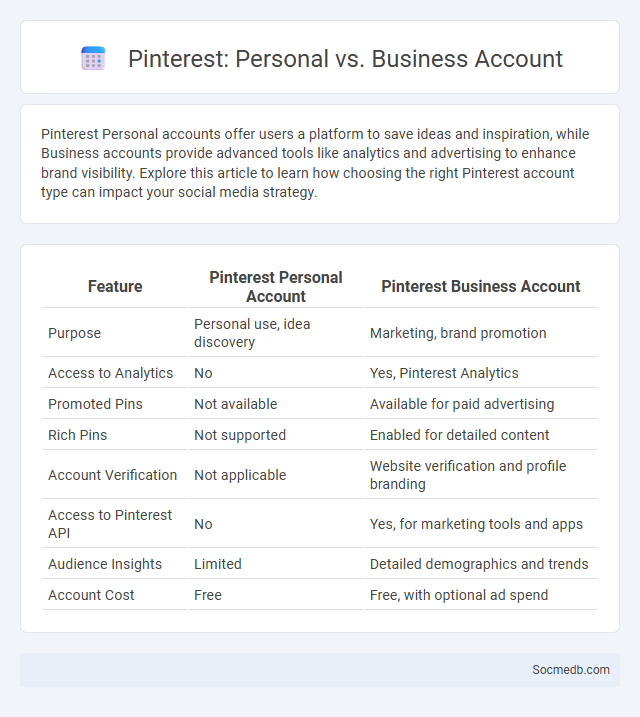
Photo illustration: Pinterest Personal vs Business account
Pinterest Personal accounts offer users a platform to save ideas and inspiration, while Business accounts provide advanced tools like analytics and advertising to enhance brand visibility. Explore this article to learn how choosing the right Pinterest account type can impact your social media strategy.
Table of Comparison
| Feature | Pinterest Personal Account | Pinterest Business Account |
|---|---|---|
| Purpose | Personal use, idea discovery | Marketing, brand promotion |
| Access to Analytics | No | Yes, Pinterest Analytics |
| Promoted Pins | Not available | Available for paid advertising |
| Rich Pins | Not supported | Enabled for detailed content |
| Account Verification | Not applicable | Website verification and profile branding |
| Access to Pinterest API | No | Yes, for marketing tools and apps |
| Audience Insights | Limited | Detailed demographics and trends |
| Account Cost | Free | Free, with optional ad spend |
Overview: Pinterest Personal vs Business Accounts
Pinterest Personal accounts offer users the ability to save and organize ideas through pins and boards for personal inspiration and hobbies. Business accounts provide advanced features like analytics, advertising options, and access to Pinterest's marketing tools, designed to help brands increase visibility and drive traffic. Switching to a business account unlocks key insights on audience engagement, aiding in content strategy optimization.
Key Differences Between Personal and Business Accounts
Personal social media accounts prioritize individual expression, connections with friends and family, and sharing life updates, while business accounts focus on brand promotion, customer engagement, and analytics-driven strategies. Business profiles often include features like advertising tools, access to insights, and integration with e-commerce platforms that are not available in personal accounts. Understanding these key differences helps you tailor your content and maximize the benefits of each account type for your goals.
Setting Up a Pinterest Personal Account
Setting up a Pinterest personal account involves choosing a unique username and adding a clear profile picture to enhance your online presence. You can organize your interests by creating boards and pinning relevant content that reflects your style or goals. Optimizing your profile bio with keywords helps your account become discoverable to others who share your interests.
Creating and Optimizing a Pinterest Business Account
Creating a Pinterest Business Account requires selecting a clear, keyword-rich profile name and crafting an engaging bio that highlights Your brand's unique value proposition. Optimize your account by consistently pinning high-quality, relevant content, using rich pins which provide extra details, and organizing boards with descriptive titles and keywords to boost discoverability. Regularly analyze Pinterest Analytics to refine your strategy, improve audience targeting, and increase traffic to Your website or online store.
Features Exclusive to Pinterest Business Accounts
Pinterest Business Accounts offer unique features like advanced analytics, enabling you to track audience engagement, demographics, and content performance. Access to Pinterest Ads allows targeted marketing campaigns designed specifically for your niche, increasing brand visibility. These accounts also provide branded content tools and rich pins, enhancing your brand's credibility and customer interaction.
Understanding Pinterest Search Intent
Pinterest search intent primarily revolves around discovery and inspiration, with users seeking ideas for projects, products, and lifestyle improvements. Keywords often reflect actionable interests like "DIY home decor," "healthy recipes," or "wedding planning tips," signaling a high intent to explore and engage with visual content. Optimizing for Pinterest involves targeting these intent-driven queries to align with user motivations, boosting visibility and engagement on the platform.
How Account Type Impacts Search Visibility
Account type significantly influences search visibility on social media platforms, as business profiles often gain access to enhanced SEO tools and features like analytics and keyword optimization. Personal accounts may have limited discoverability compared to verified or branded accounts, impacting how content ranks in platform searches. Search algorithms prioritize profiles with complete information, active engagement, and relevant keywords, making account type a crucial factor in achieving higher visibility.
Content Strategies for Personal vs Business Accounts
Personal social media content strategies prioritize authentic storytelling and engagement, utilizing relatable posts, behind-the-scenes glimpses, and interactive features to foster genuine connections. Business accounts emphasize strategic branding, targeted campaigns, and data-driven content, including product showcases, customer testimonials, and influencer collaborations to drive conversions and brand awareness. Tailoring content frequency, tone, and platform-specific features is essential for maximizing audience reach and engagement in both personal and business contexts.
Analytics and Insights: Personal vs Business Performance
Social media analytics provide crucial insights into both personal and business account performance by tracking engagement metrics such as likes, comments, shares, and follower growth. Your ability to analyze data like audience demographics, peak activity times, and content reach enables strategic content optimization and improved interaction rates. Business accounts benefit from advanced tools like conversion tracking and ROI measurement, which offer deeper understanding of marketing effectiveness and customer behavior compared to personal accounts.
Choosing the Right Account Type Based on Your Search Intent
Selecting the right social media account type hinges on clearly defining your search intent, whether for personal branding, business growth, or content discovery. Business accounts offer advanced analytics and advertising tools, essential for targeting audiences and optimizing marketing strategies effectively. Aligning your account type with your goals ensures you maximize engagement and achieve optimal visibility across your chosen platforms.
 socmedb.com
socmedb.com